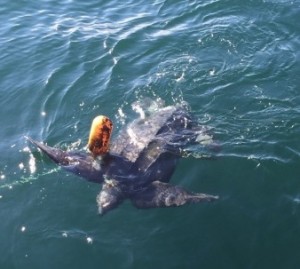
COURTESY OF THE U.S. COAST GUARD
A leatherback sea turtle was freed from entanglement near Nomans Land Island
HYANNIS – After a recent study that highlighted the number of sea turtles getting entangled in fishing gear in the region, a scientist from the New England Aquarium has offered more insight on the new data and said the best way to help sea turtles is to reduce the amount of fishing line in the water.
Dr. Kara Dodge, research scientist at the aquarium’s Anderson Cabot Center for Ocean Life, said using rope-less fishing gear and utilizing trawls instead of single traps are ways to achieve line reduction.
“All of that reduces the amount of vertical lines in the water column and reducing lines is really the best solution for sea turtles at this point,” she said.
The report included data on which species of turtles were affected by instances of bycatch. Of the 280 confirmed sea turtle entanglements, 272 of them were leatherbacks turtles.
According to Dodge, leatherbacks are more commonly seen in the region which is why they may have made up most of the entanglement instances.
She reported the turtles can weigh over a thousand pounds and have a flipper span of over 9 feet, making it more likely they will be caught up in fishing gear.
Dodge praised people on the water reporting entanglements, since those reports helped with the research efforts.
“I would really implore folks who are out on their boats to continue to keep a watchful eye out for marine life and marine life in distress and to make sure you call in those reports, because our understanding of this issue really depends on that,” she said.
Although she highlighted the importance of helpful mariners, Dr. Dodge also noted instances when mariners try to disentangle turtles without the assistance of professionals. This practice can often lead to turtles not being fully disentangled.
When asked who mariners should contact if they come across entangled marine life, Dodge responded the best organization to call is the Center for Coastal Studies hotline at 1-800-900-3622.
The scientist also stated that sea turtle population has declined over the last decade and the International Union for Conservation of Nature has categorized them as an endangered species.
Dodge said new funding has been secured for an expanding part of the study to observe the full spectrum of post-release outcomes for turtles who have been disentangled.
By Brian Engles, CapeCod.com NewsCenter
























